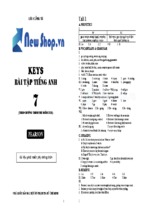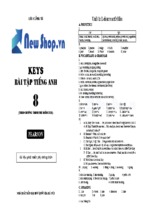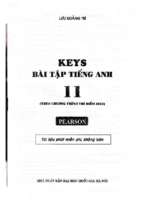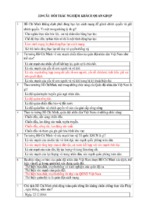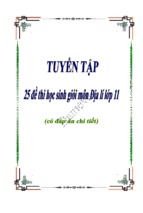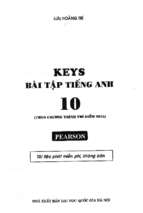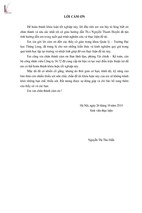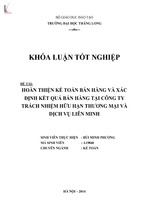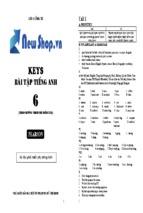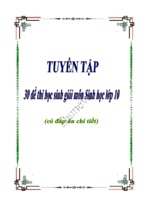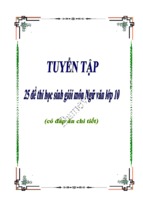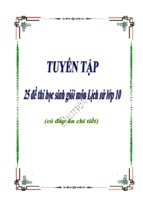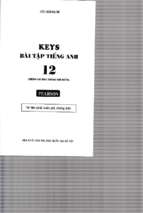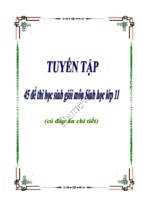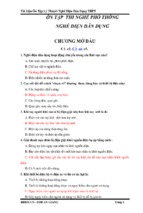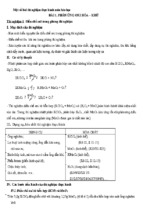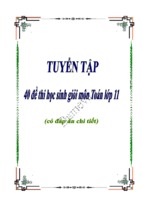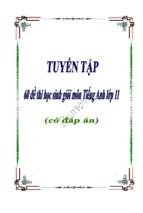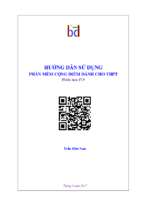Viết lại câu với nghĩa không đổi
1. “It was your fault. You broke my windows,” said the woman to him.
A. The woman insisted him on breaking her windows.
B. The woman advised him to break her windows.
C. The woman told him to break her windows.
D. The woman blamed him for having broken her windows.
2. After I had written my composition, I handed it to my teacher.
A. Writing the composition, I handed it to my teacher.
B. Having written my composition, I handed it to my teacher.
C. Handing the composition, I had written my composition
D. Handed the composition to my teacher, I wrote it.
3. They were late for the meeting because of the heavy snow.
A. If it snowed heavily, they would be late for the meeting.
B. Had it not snowed heavily, they would have been late for the meeting.
C. But for the heavy snow, they wouldn't have been late for the meeting.
D. If it didn't snow heavily, they wouldn't be late for the meeting.
4. The government have established some wildlife reserves. They want to protect endangered
species.
A. Whether the government have established some wildlife reserves or not, endangered species
are still protected.
B. Endangered species can't be protected although the government have established some wildlife
reserves.
C. The government have established some wildlife reserves so that endangered species can be
protected.
D. If the government established some wildlife reserves, they would be able to protect
endangered species.
5. He was suspected of stealing credit cards. The police have investigated him for days.
A. He has been investigated for days, suspected to have stolen credit cards.
B. Suspecting to have stolen credit cards, he has been investigated for days.
C. Having suspected of stealing credit cards, he has been investigated for days.
D. Suspected of stealing credit cards, he has been investigated for days.
6. "Do you believe in what the boy says, Mary?" said Tom.
A. Tom asked Mary if she believed in what the boy said.
B. Tom asked Mary to believe in what the boy said.
C. Tom asked Mary whether she believes in what the boy says.
D. Tom said that Mary believed in what the boy said.
7. John is fat because he eats so many chips.
A. If John didn’t eat so many chips, he would not be fat.
B. John is fat though he eats so many chips.
C. Being fat, John eats so many chips.
D. If John doesn’t eat so many chips, he will not be fat.
8. People say he won a lot of money on the lottery.
A. He is said to have won a lot of money on the lottery.
B. He was said to win a lot of money on the lottery.
C. He is said that he won a lot of money on the lottery.
D. He won a lot of money on the lottery, it is said.
9. We were all surprised when she suddenly came back.
A. All of us found it surprising that she suddenly came back.
B. The fact that we were surprised made her come back.
C. All of us were amazing to see her come back.
D. She was surprised, coming back suddenly.
10. "I am sorry, I forgot our appointment yesterday," said Jean to the dentist.
A. Jean apologized the dentist for having forgotten our appointment the day before.
B. Jean apologized to the dentist for having forgotten their appointment the day before.
C. Jean apologized the dentist having forgotten their appointment the day before.
D. Jean apologized to the dentist for having forgotten our appointment the day before.
11. She said it had nothing to do with me.
A. She told me that it was none of my business.
B. She told me that it had done nothing for me.
C. She said I did nothing about it.
D. She said she had done nothing for me.
12. Members are reminded that they are responsible for any damage caused by their
guests.
A. If your guests break anything, you’ll have to pay.
B. If guests are hurt, members have to look after them.
C. Please don’t let guests make too much noise.
D. Please remember to look after guests very politely.
13. This material is suitable for students of eighteen years and up.
A. The material may be suitable for students of over eighteen years of age.
B. This material is suitable for students who are over eighteen.
C. Only 18-year-old students will find this material suitable.
D. Students of eighteen years and over can use this material.
14. There is an important difference between humans and chimpanzees. Chimpanzees walk
on four legs.
A. There is an important difference between humans and chimpanzees that walk on four legs.
B. Chimpanzees walk on four legs, so they are importantly different from humans.
C. An important difference between humans and chimpanzees is that chimpanzees walk on four
legs.
D. There are important differences between humans and chimpanzees one of which is that
chimpanzees walk on four legs.
15. There were over two hundred people at Carl's trial, most of whom believed that he was
not guilty of the crime.
A. Carl had not committed the crime, and so more than 200 people came to his trial to show their
support.
B. The majority of more than 200 people at Carl's trial didn't think that he had committed the
crime.
C. Over 200 people coming to Carl's trial must have influenced the fact that he was not found
guilty of the crime.
D. When it was announced that Carl had been found not guilty of the crime, there were over 200
people in the audience at his trial.
16. He has a box. He plans to put his savings in it
A. He has a box putting his savings in.
B. He has a box to put his savings in.
C. He has a box to put his savings in it.
D. He has a box planning to put his savings in.
17. Do you realize that I would have been given that job if you had not been silent?
A. As you did not talk, I did not get the job.
B. Because you asked, I did not get the job.
C. Although you asked, I got the job.
D. Although you did not talk, I got the job.
18. I regret not visiting Washington when I was in America.
A. I regret to say that I didn’t like to visit Washington when I was in America.
B. I now wish I had visited Washington when I was in America
C. I don’t regret visiting Washington when I was in America.
D. I visited Washington when I was in America but now I regret it
19. For fear of waking up the family, Trung tiptoed upstairs.
A. Trung tiptoed upstairs because he didn’t want to wake up the family.
B. Trung tiptoed upstairs so as not to wake up the family.
C. The family feared when Trung tiptoed upstairs.
D. Trung tiptoed upstairs lest the family should be woken up.
20. The student next to me kept chewing gum. That bothered me a lot.
A. The student next to me kept chewing gum, that bothered me a lot.
B. The student next to me kept chewing gum, bothered me a lot.
C. The student next to me kept chewing gum, which bothered me a lot.
D. The student next to me kept chewing gum, bothering me a lot.
21. “Congratulations! You’ve won the scholarship,” he said .
A. He said that congratulations! I had won the scholarship.
B. He said I had won the scholarship and he congratulated
C. He congratulated me on having won the scholarship.
D. He congratulated me of winning the scholarship.
22. He dislikes people asking him about his job.
A. Asking him about his job is disliked.
B. He dislikes being asked about his job.
C. His job is disliked asking about.
D. People are disliked asking about his job.
23. Let’s start our journey or we’ll be late.
A. If we start our journey, we won’t be late.
B. Unless we start our journey, we won’t be late.
C. If we don’t start our journey, we’ll be late.
D. We would be late if we didn’t start our journey.
24. Mary knew how busy I was. She offered to help me.
A. Because Mary knew my business, she offered to help me.
B. Knowing how busy I was, Mary offered to help me.
C. Mary knew how I was busy and offered to help me.
D. Having known how busy I was, Mary offered to help me.
25. Animals can’t speak our language. They can’t tell us when they are unhappy or annoyed.
A. If animals could speak, they would be able to tell us when they are unhappy or annoyed.
B. One day we could speak animals’ language and know when they are happy or annoyed.
C. We don’t know when animals are unhappy or annoyed because we don’t know their language.
D. We don’t understand animals because we can’t speak their language.
26. You can enrich your knowledge by listening to the radio
A. You can be rich if you listen to the radio
B. Listening to the radio makes you know less.
C. Listening to the radio enables you to be rich
D. Listening to the radio can make you know more.
27. I only recognized him when he came into the light
A. Not until he came into the light that I recognized him.
B. Not until did he come into the light that I recognized him.
C. Not until he came into the light did I recognize him.
D. Only when he came into the light that I recognized him.
28. The meeting was put off because of pressure of time.
A. There was not enough time to hold the meeting.
B. People wanted to get away, so the meeting began early.
C. The meeting is planned to start in a short time.
D. The meeting lasted much longer than usual.
29. She phoned him early in the morning. She wanted to make sure she caught him before
he left for work.
A. She phoned him early in the morning so as to want to catch him before he left home.
B. She phoned him early in the morning lest she should catch him before he left for work.
C. She phoned him early in the morning because she wanted to make sure she caught him before
he left for work.
D. She phoned him early in the morning so that she wanted to make sure she caught him before
he left to work.
30. I’ve been out of the country for nearly a year, so I’m out of touch with everything here.
A. A year or so abroad will make you feel different about your own country.
B. On my return after almost a year, I was touched to find so few changes here.
C. I feel quite like a stranger now that I’m back after almost a year abroad.
D. The year abroad has estranged me, so I don’t want to go back to my own country
31. “What are you going to do with such a long list of books, Dane?” asked Sarah
A. Sarah was curious why Dane had such a long list of books
B. Sarah asked Dane what he was going to do with such a long list of books
C. Sarah could not understand why Dane was borrowing such a long list of books
D. Sarah warned Dane not to borrow such a long list of books
32. When I picked up my book I found that the cover had been torn
A. Picking up my book, the cover had been torn
B. On picking up the book, I saw that the cover had been torn
C. Picked up, I saw that the cover of the book was torn
D. The cover had been torn when my book picked up
33. The Internet has enabled most people to get contact in a matter of moments.
A. Most people have been able to get in contact by the Internet in a matter of moments.
B. Most people have got in contact as enabled in a matter of moments by the Internet
C. On the Internet, most people are able to get in contact in a matter of moments
D. On the Internet, most people can find their contacts in a matter of moments.
34. The teacher has done his best to help all students. However, none of them made any effort on
their part.
A. The teacher has done his best to help all students, then, none of them made any effort on their
part
B. Although the teacher has done his best to help all students, none of them made any effort on
their part
C. Because the teacher has done his best to help all students, none of them made any effort on
their part
D. If the teacher has done his best to help all students, none of them made any effort on their part
35. “Finish your work. And then you can go home.”
A. “You can’t go home until you finish your work.”
B. “You finish your work to go home as early as you can.”
C. “When you go home, finish your work then.”
D. “Because you have finished your work, you can go home.”
36. He behaved so recklessly, so he would be disqualified from keeping his last job
A. If he hadn’t behaved so recklessly, he hadn’t quit his last job
B. Without his reckless behavior, he would have lost his last job
C. Had he not behaved so recklessly, he wouldn’t have been fired from his last job
D. He didn’t quit his job because he knew that he had behaved so recklessly
37. I can’t stand his talking foolishly when everybody talks about something in a serious way.
A. Everybody talks seriously when he talks foolishly
B. I don’t mind his talking foolishly when everybody talks seriously
C. I can’t understand what he talks when people talk foolishly
D. I hate him talking foolishly when people talk seriously
38. “If I were you, I wouldn’t read the job advertisement and position description carelessly.”
Helen said.
A. Helen recommended that I take no notice of the job advertisement and position description
B. Helen advised me on reading the job advertisement and position description carelessly.
C. Helen advised me against reading the job advertisement and position description carelessly
D. I was blamed for not reading the job advertisement and position description carefully by
Helen.
39. The holiday was so expensive. We could only afford five days.
A. It was such an expensive holiday that we could only afford five days.
B. The holiday was dirt cheap, so we could afford more than five days.
C. So expensive was a five-day holiday that we could hardly afford it.
D. A five-day holiday wasn’t cheap, so we couldn’t afford it.
40. The basketball team knew they lost the match. They soon started to blame each other.
A. As soon as they blamed each other, the basketball team knew they lost the match.
B. No sooner had the basketball team started to blame each other than they knew they lost the
match.
C. Not only did the basketball team lose the match but they blamed each other as well.
D. Hardly had the basketball team known they lost the match when they started to blame each
other
41. Due to the fact that the demand for tea was very high in the 19th century, its price was
astronomical.
A. It was not until the 19th century that the demand for tea started to increase.
B. It was its astronomical price which decreased the demand for tea in the 19th century.
C. In the 19th century the price for tea didn’t increase despite the demand.
D. The demand for tea was so high in the 19th century that its price was enormous.
42. “You should have finished the report by now”, John told his secretary.
A. John reproached his secretary for not having finished the report.
B. John said that his secretary had not finished the report.
C. John reminded his secretary of finishing the report on time.
D. John scolded his secretary for not having finished the report.
43. He is an authority on primitive religion.
A. He is famous for his vast knowledge of primitive religion.
B. He has authority over the people who practise primitive religion.
C. He has a great influence on the people who practise primitive religion.
D. He has official permission to practice primitive religion.
44. Her living conditions were not good. However, she studied very well.
A. Living in difficult conditions forced she to study very well.
B. She studied very well just because she lived in difficult conditions.
C. Difficult as her living conditions were, she studied very well.
D. Living in difficult conditions, she had no choice but to study well.
45. His wife phoned him early in the morning. She didn’t want him to forget to bring along the
document.
A. His wife phoned him early in the morning lest he would forget to bring along the document.
B. His wife phoned him early in the morning so that she wanted him to bring along the document.
C. His wife phoned him early in the morning when she didn’t want him to bring along the
document.
D. His wife phoned him early in the morning though she didn’t want him to forget to bring along
the document.
46. “If you touch my bike again, I’ll tell mother”, said my elder brother.
A. My elder brother threatened to tell mother if I touched his bike again.
B. My elder brother said that he would not tell mother if I touched his bike again.
C. My elder brother advised me to tell mother if I touched his bike again.
D. My elder brother tried to convince me that touching his bike again is unallowed.
47. Lucy always reminds me of my youngest sister.
A. My youngest sister’s name is Lucy.
B. I always think of Lucy, my youngest sister.
C. Whenever I see Lucy, I think of my youngest sister.
D. It is Lucy who is my youngest sister.
48. They had such a fierce dog that nobody would visit them.
A. So fierce was their dog that nobody would visit them.
B. Their dog was fierce enough for anybody to visit them.
C. If their dog weren’t fierce, somebody would visit them.
D. So fierce a dog did they had that nobody would visit them
49. I think my hair looks fine. My mother believes it needs a little more brushing.
A. Not only do I think my hair looks fine, but my mother also believes it needs a little more
brushing.
B. Either my mother believes it needs a little more brushing or I think my hair looks fine.
C. I think my hair looks so fine that my mother believes it needs a little more brushing.
D. I think my hair looks fine, but my mother believes it needs a little more brushing.
50. We can protect the world in which we live. We, for example, can grow more trees and recycle
rubbish.
A. We can protect the world in which we live by growing more trees and recycling rubbish.
B. We can protect the world in which we live as well as we can grow more trees and recycle
rubbish.
C. We can protect the world in which we live, growing more trees and recycle rubbish.
D. We can protect the world in which we live such as growing more trees and recycling rubbish
51. Mr. Smith is very interested in our plan. I spoke to him on the phone last night.
A. Mr. Smith is very interested in our plan to whom I spoke on the phone last night.
B. Mr. Smith, who is very interested in our plan, I spoke to on the phone last night.
C. Mr. Smith, who I spoke on the phone last night, is very interested in our plan.
D. Mr. Smith, to whom I spoke on the phone last night, is very interested in our plan.
52. When the unemployment rate is high, the crime rate is usually also high.
A. The unemployment rate is as high as the crime rate.
B. The unemployment rate and the crime rate are both higher.
C. The higher the unemployment rate is, the higher the crime rate is.
D. The high rate of unemployment depends on the high rate of crime.
53. "It can't be Mike who leaked the document, it might be Tom." said our manager.
A. Our manager made it clear that Tom was the one who leaked the document, not Mike.
B. Our manager blamed Tom for having leaked the document instead of Mike.
C. Our manager showed his uncertainty about who leaked the document: Mike or Tom.
D. Our manager suspected Tom of having leaked the document, not Mike.
54. The student next to me kept chewing gum. That bothered me a lot.
A. The student next to me kept chewing gum, which bothered me a lot.
B. The student next to me kept chewing gum, that bothered me a lot.
C. The student next to me kept chewing gum bothering me a lot.
D. The student next to me kept chewing gum bothered me a lot.
55. You’d better take the keys. It’s possible I’ll come home late.
A. You’d better take the keys as I possibly come home late.
B. If I come home late, you’d better take the keys.
C. I’ll probably come home late so that you’d better take the keys.
D. You’d better take the keys in case I come home late.
56. However old and worn his clothes were, they look clean and of good quality.
A. His clothes looked clean and of good quality but they were old and worn.
B. His clothes, though old and worn, looked clean and of good quality.
C. He was fond of wearing such old and worn clothes because they were of good quality.
D. No matter what good quality his clothes had, they looked old and worn.
57. In spite of his poverty, he led a devoted life to the revolutionary cause.
A. He could not devote his life to the revolutionary cause because of his poverty.
B. If he had not been so poor, he could have devoted his life to the revolutionary cause.
C. Poor as he was, he led a devoted life to the revolutionary cause.
D. He led a devoted life to the revolutionary cause, but he was so poor.
58. I thought I should not stay at home yesterday.
A. I regretted staying at home yesterday.
B. I regretted for staying at home yesterday.
C. I regret for staying at home yesterday.
D. I regret to stay at home yesterday.
59. People should not throw rubbish in the park. People should not cut down the trees in the park.
A. People should either throw rubbish in the park or cut down the trees in the park.
B. People should neither throw rubbish nor cut down the trees in the park.
C. People should either throw rubbish nor cut down the trees in the park.
D. People should neither throw rubbish or cut down the trees in the park
60. Most of the classmates couldn't come. He invited them to the birthday party.
A. Most of the classmates he invited to the birthday party couldn't come.
B. Most of the classmates he was invited to the birthday party couldn't come.
C. Most of the classmates that he invited them to the birthday party couldn't come.
D. Most of the classmates which he invited to the birthday party couldn't come
61. You shouldn't have allowed them to watch too much TV.
A. You were wrong to let them watch too much TV.
B. You allowed them to watch too much TV which is wrong.
C. It was not necessary to allow them to watch too much TV.
D. Watching too much TV is not good for them.
62. “I didn’t break the window” Jim said.
A. Jim refused to break the window.
B. Jim denied breaking the window.
C. Jim admitted breaking the window.
D. Jim told he didn’t break the window.
64. We had spent nearly all our money. So we couldn’t afford to stay in a hotel.
A. Having spent nearly all our money, so we couldn’t afford to stay in a hotel.
B. Spent nearly all our money, we couldn’t afford to stay in a hotel.
C. Having spent nearly all our money, we couldn’t afford to stay in a hotel.
D. After having spent nearly our all money, we couldn’t afford to stay in a hotel.
65. Venus is always seen near the sun just before sunrise and soon after sunset. It is called the
morning or evening star.
A. Venus which is always seen near the sun just before sunrise and soon after sunset is called the
morning or evening star.
B. Venus, that is always seen near the sun just before sunrise and soon after sunset, is called the
morning or evening star.
C. Venus is always seen near the sun just before sunrise and soon after sunset which is called the
morning or evening star.
D. Venus, which is always seen near the sun just before sunrise and soon after sunset, is called
the morning or evening star.
66. There was no need for you to have left the house in such weather.
A. You shouldn’t leave the house in such weather.
B. You didn’t have to leave the house in such weather.
C. You didn’t need to leave the house in such weather.
D. You needn’t have left the house in such weather.
67. If it hadn’t been for his carelessness, we would have finished the work.
A. He was careless because we hadn’t finished the work.
B. If he were careful, we would finish the work.
C. If he had been more careful, we would have completed the work.
D. Because he wasn’t careless, we didn’t finish the work.
68. It's thought that the accident was caused by human error.
A. The accident took place because of thoughtlessness.
B. Humans' thoughtlessness caused the accident.
C. The accident is thought to have been caused by human error.
D. The accident is thought to cause human error.
69. I thought they might be hungry. I offered them something to eat.
A. Thinking they might be hungry, I offered them something to eat.
B. Thought they might be hungry, I offered them something to eat.
C. I thought they might be hungry, offering them something to eat.
D. Having thought they might be hungry, I offered them something to eat.
70. He wore glasses and a false beard. He wanted nobody to recognize him.
A. He wore glasses and a false beard in order to avoid being recognizing.
B. He wore glasses and a false beard in order to avoid recognizing.
C. He wore glasses and a false beard in order that avoid being recognized.
D. He wore glasses and a false beard in order to avoid being recognized
71. “Can I sit beside you, Jean?” Tom asked.
A. Tom asked Jean to sit beside him.
B. Tom invited Jean to sit beside him.
C. Tom requested Jean if he could sit beside Jean.
D. Tom asked Jean if he could sit beside her.
72. They let us play in the garden.
A. They allow to play in the garden.
B. We are allowed to play in the garden.
C. They allow us playing in the garden.
D. We are let to play in the garden.
73. I haven’t seen either James or his sister for a very long time now.
A. It has been a long time since I saw either James or his sister.
B. I know I’ve met James, but I don’t think I’ve met his sister before.
C. Neither James nor his sister has been seen by anyone for ages.
D. I’ve met both James and his sister before, but it was a long time ago.
74. Until I saw her for myself, I didn’t think that Naomi had been badly wounded.
A. As soon as I saw Naomi, I knew that her injuries were very serious.
B. Naomi hadn’t been hurt very badly, and I became aware of that at the time that I saw her.
C. It was only when I saw Naomi that I realized how seriously she had been injured.
D. Before I had seen Naomi’s wounds, I had supposed that they were extremely bad.
75. John has no intention of coming to the party, so we may as well not invite him.
A. None of us wants John to be at the party, so we may as well not invite him.
B. Let’s not invite John to the party unless he promises to come.
C. As he doesn’t mean to come anyway, we needn’t ask John to the party.
D. Because he never wants to come, we never ask John to parties with us
Câu 1: Đáp án D
"Đó là lỗi của anh. Anh đã phá vỡ cửa sổ của tôi, "người phụ nữ nói với anh ta.
A. Người phụ nữ khăng khăng đòi anh phá cửa sổ.
B. Người phụ nữ khuyên anh ta phá cửa sổ của cô.
C. Người phụ nữ nói với anh ta để phá vỡ cửa sổ của cô.
D. Người phụ nữ đổ lỗi cho anh vì đã phá vỡ cửa sổ của cô.
Câu 2: Đáp án B
Sau khi tôi viết bài viết của mình, tôi đưa nó cho giáo viên của mình.
A, C, D sai thì của câu
Câu 3: Đáp án C
Họ đã đến trễ cho cuộc họp vì tuyết rơi nhiều.
A. Nếu tuyết rơi nhiều, họ sẽ đến trễ cho cuộc họp.
B. Nếu nó không bị tuyết rơi, họ sẽ bị trễ cuộc họp.
C. Nếu không vì tuyết rơi nhiều, họ sẽ không bị trễ cuộc họp.
D. Nếu tuyết không rơi nhiều, họ sẽ không đến trễ cho cuộc họp.
Câu 4: Đáp án C
Câu 5: Đáp án D
Câu 6: Đáp án A
Câu 7: Đáp án A
Câu 8: Đáp án A
Câu 9: Đáp án A
Câu 10: Đáp án B
Apologize sb for sth: xin lỗi ai về điều gì
Câu 11: Đáp án A
Câu 12: Đáp án A
Các thành viên được nhắc nhở rằng họ chịu trách nhiệm cho bất kỳ thiệt hại nào gây ra từ phía
khách hàng của họ.
A. Nếu khách của bạn phá vỡ bất cứ điều gì, bạn sẽ phải trả tiền.
B. Nếu khách bị thương, các thành viên phải chăm sóc họ.
C. Xin đừng để khách gây ra quá nhiều tiếng ồn.
D. Hãy nhớ chăm sóc khách rất lịch sự.
Câu 13: Đáp án D
Tài liệu này phù hợp cho sinh viên từ 18 tuổi trở lên.
A. Các tài liệu có thể phù hợp cho sinh viên trên mười tám tuổi.
B. Tài liệu này phù hợp với những sinh viên trên 18 tuổi.
C. Chỉ những học sinh 18 tuổi mới thấy tài liệu này phù hợp.
D. Học sinh từ mười tám tuổi trở lên có thể sử dụng tài liệu này.
Câu 14: Đáp án C
Câu 15: Đáp án B
Câu 16: Đáp án B
Câu 17: Đáp án A
Bạn có nhận ra rằng tôi sẽ được giao công việc đó nếu bạn không im lặng?
A. Như bạn đã không nói, tôi đã không nhận được công việc.
B. Bởi vì bạn hỏi, tôi đã không nhận được công việc.
C. Mặc dù bạn hỏi, tôi đã nhận được công việc.
D. Mặc dù bạn không nói, tôi đã nhận được công việc.
Câu 18: Đáp án B
Tôi rất tiếc khi không đến Washington khi tôi ở Mỹ.
A. Tôi rất tiếc khi nói rằng tôi không thích đến thăm Washington khi tôi ở Mỹ.
B. Bây giờ tôi ước tôi đã đến Washington khi tôi ở Mỹ
C. Tôi không hối tiếc khi đến Washington khi tôi ở Mỹ
D. Tôi đã đến thăm Washington khi tôi ở Mỹ nhưng bây giờ tôi rất hối tiếc vì điều đó
Câu 19: Đáp án D
Câu 20: Đáp án C
Câu 21: Đáp án C
"Xin chúc mừng! Bạn đã giành được học bổng, ”ông ta nói.
A. Ông nói rằng xin chúc mừng! Tôi đã giành được học bổng.
B. Ông ấy nói tôi đã giành được học bổng và anh ấy chúc mừng
C. Ông chúc mừng tôi đã giành được học bổng.
D. Sai cấu trúc
Câu 22: Đáp án B
Câu 23: Đáp án B
Hãy bắt đầu chuyến đi hoặc chúng tôi sẽ đến trễ.
A. Nếu chúng ta bắt đầu chuyến đi, chúng ta sẽ không đến trễ.
B. Trừ khi chúng ta bắt đầu đi, chúng ta sẽ không đến trễ.
C. Nếu chúng ta không bắt đầu đi, chúng ta sẽ đến trễ
D. Chúng tôi đã đến trễ nếu chúng tôi không bắt đầu đi.
Câu 24: Đáp án C
Câu 25: Đáp án C
Câu 26: Đáp án D
Bạn có thể làm phong phú kiến thức của mình bằng cách nghe radio
A. Bạn có thể giàu nếu bạn nghe radio
B. Nghe radio giúp bạn biết ít hơn.
C. Nghe radio giúp bạn giàu có
D. Nghe radio có thể giúp bạn biết nhiều hơn.
Câu 27: Đáp án B
Câu 28: Đáp án A
Cuộc họp đã bị hoãn lại vì áp lực về thời gian.
A. Không có đủ thời gian để tổ chức cuộc họp.
B. Mọi người muốn thoát ra, vì vậy cuộc họp bắt đầu sớm.
C. Cuộc họp được lên kế hoạch để bắt đầu trong một thời gian ngắn.
D. Cuộc họp kéo dài lâu hơn bình thường.
Câu 29: Đáp án C
Câu 30: Đáp án C
Tôi đã ra khỏi đất nước gần một năm, vì vậy tôi đã mất liên lạc với mọi người ở đây.
A. Một năm hoặc lâu hơn ở nước ngoài sẽ làm cho bạn cảm thấy khác biệt về đất nước của bạn.
B. Khi tôi trở về sau gần một năm, tôi cảm động khi thấy có ít thay đổi ở đây.
C. Tôi cảm thấy khá giống một người lạ khi tôi trở lại sau gần một năm ở nước ngoài.
D. Năm ở nước ngoài đã thay đổi tôi, vì vậy tôi không muốn quay trở lại đất nước của mình
Câu 31: Đáp án B
"Bạn sẽ làm gì với một danh sách dài như vậy, Dane?" Sarah hỏi
A. Sarah đã tò mò tại sao Dane có một danh sách dài các cuốn sách
B. Sarah hỏi Dane rằng anh ta sẽ làm gì với một danh sách dài các cuốn sách
C. Sarah không thể hiểu tại sao Dane lại mượn một danh sách dài như vậy
D. Sarah cảnh báo Dane không mượn một danh sách dài các cuốn sách
Câu 32: Đáp án A
Câu 33: Đáp án C
Câu 34: Đáp án B
Câu 35: Đáp án A
"Hoàn thành công việc của bạn. Và sau đó bạn có thể về nhà.”
A. "Bạn không thể về nhà cho đến khi bạn hoàn thành công việc của mình."
B. "Bạn hoàn thành công việc của bạn để về nhà càng sớm càng tốt."
C. "Khi bạn về nhà, hoàn thành công việc của bạn sau đó."
D. "Bởi vì bạn đã hoàn thành công việc của bạn, bạn có thể về nhà."
Câu 36: Đáp án C
Anh ta cư xử rất liều lĩnh, vì vậy anh ta sẽ bị loại khỏi việc giữ công việc cuối cùng của mình
A. Sai cấu trúc câu điều kiện
B. Nếu không có hành vi liều lĩnh của mình, anh sẽ mất công việc cuối cùng của mình
C. Nếu anh ta không cư xử quá liều lĩnh, anh ta sẽ không bị sa thải khỏi công việc cuối cùng của
mình
D. Anh ấy đã không bỏ công việc của mình bởi vì anh ấy biết rằng anh ấy đã cư xử rất liều lĩnh
Câu 37: Đáp án D
Tôi không thể chịu được cách nói chuyện dại dột của anh ta khi mọi người nói về điều gì đó
nghiêm túc.
A. Mọi người đều nói nghiêm túc khi anh ta nói một cách dại dột
B. Tôi không ngại nói chuyện ngu ngốc khi mọi người nói nghiêm túc
C. Tôi không thể hiểu những gì anh ấy nói khi mọi người nói chuyện ngu ngốc
D. Tôi ghét anh ta nói chuyện ngu ngốc khi mọi người nói nghiêm túc
Câu 38: Đáp án C
“Nếu tôi là bạn, tôi sẽ không đọc quảng cáo việc làm và mô tả vị trí một cách bất bất cẩn.” Helen
nói.
A. Helen khuyên tôi không chú ý đến quảng cáo việc làm và mô tả vị trí
B. Helen khuyên tôi đọc quảng cáo việc làm và mô tả vị trí một cách bất cẩn.
C. Helen khuyên tôi không nên đọc quảng cáo việc làm và mô tả vị trí một cách bất cẩn
D. Tôi bị đổ lỗi vì không đọc quảng cáo việc làm và mô tả vị trí cẩn thận bởi Helen
Câu 39: Đáp án A
Câu 40: Đáp án D
Question 41: Đáp án D
A. Mãi cho đến thế kỷ 19, nhu cầu về trà bắt đầu tăng lên.
B. Đó là giá thiên văn của nó làm giảm nhu cầu về trà trong thế kỷ 19.
C. Trong thế kỷ 19, giá chè không tăng bất chấp nhu cầu.
D. Nhu cầu về trà rất cao trong thế kỷ 19 rằng giá của nó rất lớn.
Question 42: Đáp án D
A. John đã chửi rủa thư ký của mình vì không hoàn thành báo cáo.
B. John nói rằng thư ký của anh ta đã không hoàn thành báo cáo.
C. John nhắc nhở thư ký của mình về việc hoàn thành báo cáo đúng giờ.
D. John mắng thư ký vì chưa hoàn thành báo cáo.
Question 43: Đáp án A
A. Ông nổi tiếng với kiến thức rộng lớn của ông về tôn giáo nguyên thủy.
B. Ngài có thẩm quyền đối với những người thực hành tôn giáo nguyên thủy.
C. Ông có ảnh hưởng lớn đến những người thực hành tôn giáo nguyên thủy.
D. Ông có quyền chính thức để thực hành tôn giáo nguyên thủy.
Question 44: Đáp án C
Question 45: Đáp án sai đề
Question 46: Đáp án A
“Nếu mày chạm vào xe đạp của tao một lần nữa, tao sẽ nói với mẹ”, anh trai tôi nói.
A. Anh trai của tôi đe dọa sẽ nói với mẹ nếu tôi chạm vào chiếc xe đạp của anh ta một lần nữa.
B. Anh trai tôi nói rằng anh sẽ không nói với mẹ nếu tôi chạm vào chiếc xe đạp của anh lần nữa.
C. Anh trai tôi khuyên tôi nên nói với mẹ nếu tôi chạm vào chiếc xe đạp của anh ta một lần nữa.
D. Anh trai tôi cố gắng thuyết phục tôi rằng việc chạm vào chiếc xe đạp của anh ta một lần nữa
là không được phép.
Question 47: Đáp án C
Lucy luôn nhắc tôi nhớ về em gái út của tôi.
- Xem thêm -


